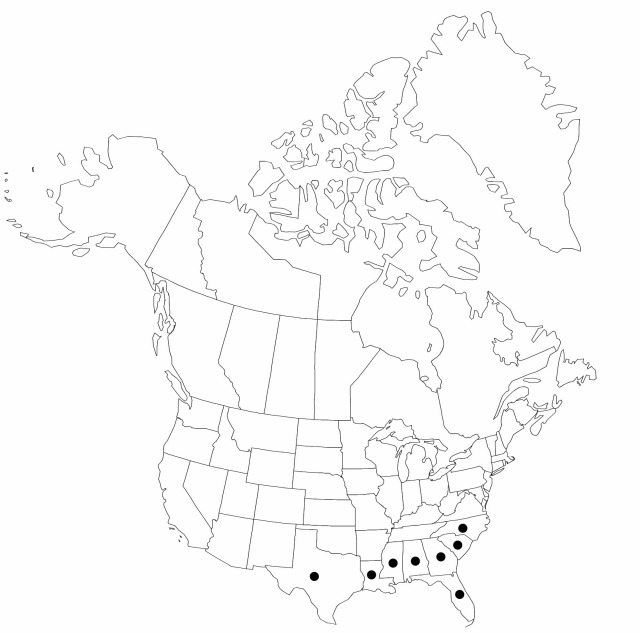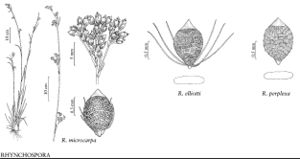Difference between revisions of "Rhynchospora microcarpa"
Ann. Lyceum Nat. Hist. New York 3: 202. 1835.
FNA>Volume Importer |
FNA>Volume Importer |
||
| Line 11: | Line 11: | ||
|name=Phaeocephalum microcarpum | |name=Phaeocephalum microcarpum | ||
|authority=(Baldwin ex A. Gray) House | |authority=(Baldwin ex A. Gray) House | ||
| − | }}{{Treatment/ID/Synonym | + | }} {{Treatment/ID/Synonym |
|name=Phaeocephalum patulum | |name=Phaeocephalum patulum | ||
|authority=(A. Gray) House | |authority=(A. Gray) House | ||
| − | }}{{Treatment/ID/Synonym | + | }} {{Treatment/ID/Synonym |
|name=Rhynchospora edisoniana | |name=Rhynchospora edisoniana | ||
|authority=Small | |authority=Small | ||
| − | }}{{Treatment/ID/Synonym | + | }} {{Treatment/ID/Synonym |
|name=Rhynchospora sulcata | |name=Rhynchospora sulcata | ||
|authority=Gale | |authority=Gale | ||
| − | }}{{Treatment/ID/Synonym | + | }} {{Treatment/ID/Synonym |
|name=Rhynchospora torreyana var. microrhyncha | |name=Rhynchospora torreyana var. microrhyncha | ||
|authority=Grisebach | |authority=Grisebach | ||
| Line 38: | Line 38: | ||
|elevation=0–100 m | |elevation=0–100 m | ||
|distribution=Ala.;Fla.;Ga.;La.;Miss.;N.C.;S.C.;Tex.;West Indies. | |distribution=Ala.;Fla.;Ga.;La.;Miss.;N.C.;S.C.;Tex.;West Indies. | ||
| − | |discussion=<p>Through much of the range of Rhynchospora microcarpa, particularly in limesink or claybased pond areas, is a somewhat shorter series of plants with narrow leaves, tumid fruit 0.7–0.9 mm, often with isodiametric alveolae and depressedtriangular tubercles. Described by S. Gale as R. sulcata, the plants grade into the more typical morphology for R. microcarpa. In peninsular Florida, apparent intergradation with R. elliottii produces some individuals with broad leaves and triangularsubulate tubercles on nearly flat fruits.</p> | + | |discussion=<p>Through much of the range of <i>Rhynchospora microcarpa</i>, particularly in limesink or claybased pond areas, is a somewhat shorter series of plants with narrow leaves, tumid fruit 0.7–0.9 mm, often with isodiametric alveolae and depressedtriangular tubercles. Described by S. Gale as R. sulcata, the plants grade into the more typical morphology for <i>R. microcarpa</i>. In peninsular Florida, apparent intergradation with <i>R. elliottii</i> produces some individuals with broad leaves and triangularsubulate tubercles on nearly flat fruits.</p> |
|tables= | |tables= | ||
|references= | |references= | ||
| Line 62: | Line 62: | ||
|publication year=1835 | |publication year=1835 | ||
|special status= | |special status= | ||
| − | |source xml=https://jpend@bitbucket.org/aafc-mbb/fna-data-curation.git/src/ | + | |source xml=https://jpend@bitbucket.org/aafc-mbb/fna-data-curation.git/src/8f726806613d60c220dc4493de13607dd3150896/coarse_grained_fna_xml/V23/V23_403.xml |
|genus=Rhynchospora | |genus=Rhynchospora | ||
|species=Rhynchospora microcarpa | |species=Rhynchospora microcarpa | ||
Revision as of 17:07, 18 September 2019
Plants perennial, cespitose, to 100 cm; rhizomes absent. Culms erect to ascending, arching, lax, leafy, slender, trigonous. Leaves exceeded by inflorescence; blades ascending to spreading, linear, proximally flat, 1–2(–3) mm wide, apex trigonous, subulate, tapering. Inflorescences: spikelet clusters 4–6, mostly dense, widely spaced, narrowly turbinate to ellipsoid; peduncles erect to ascending, branches ascending; leafy bracts exceeding proximal clusters. Spikelets dark brown, ovoid, 2–3 mm, apex acute; fertile scales broadly ovate to ± orbiculate, cupulate, 1.5–2 mm, apex rounded to acute, midrib included or excurrent as bristle. Flowers: perianth bristles 6, from vestigial to (rarely) reaching tubercle tip, antrorsely barbellate. Fruits 2–3 per spikelet, 1.2–1.5 mm; body brown, obovoid to globose, lenticular, 1–1.2 × 0.8–1 mm, margins narrow, distinct; surfaces sharply transversely wavyrugose, intervals with rows of vertical, broadly rectangular or ± isodiametric alveolae; tubercle lowtriangular or triangular, compressed, 0.2–0.3 mm, base lunate.
Phenology: Fruiting late spring–fall or all year (south).
Habitat: Savanna swales, interdunal marshes, broad marshes, wet glades, bog edges, open swamp forests, pond shores
Elevation: 0–100 m
Distribution

Ala., Fla., Ga., La., Miss., N.C., S.C., Tex., West Indies.
Discussion
Through much of the range of Rhynchospora microcarpa, particularly in limesink or claybased pond areas, is a somewhat shorter series of plants with narrow leaves, tumid fruit 0.7–0.9 mm, often with isodiametric alveolae and depressedtriangular tubercles. Described by S. Gale as R. sulcata, the plants grade into the more typical morphology for R. microcarpa. In peninsular Florida, apparent intergradation with R. elliottii produces some individuals with broad leaves and triangularsubulate tubercles on nearly flat fruits.
Selected References
None.
